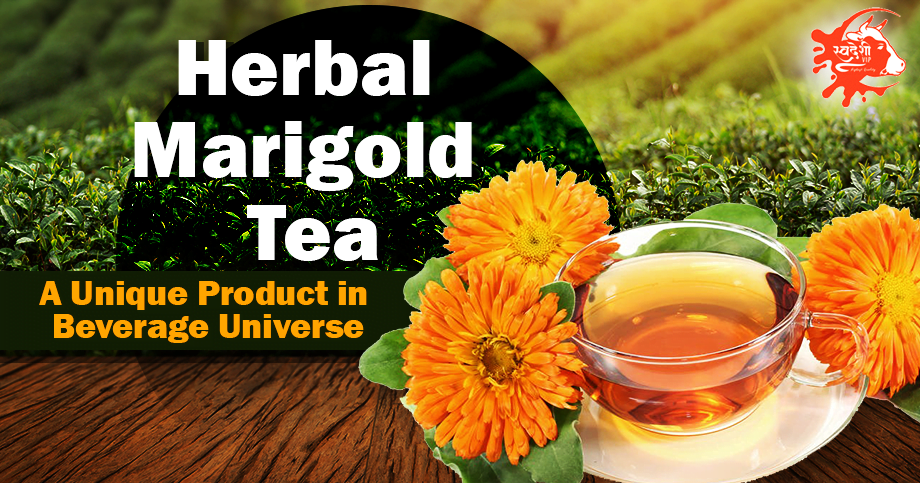
The trend towards herbal teas and holistic health is changing the world. Herbal marigold tea is in demand due to its wide range of advantages varying from skin health to preventing serious heart illnesses. The dried blossoms of the marigold flower, a widely cultivated garden plant worldwide, are used to make marigold tea. The anti-inflammatory and antioxidant characteristics of herbal marigold tea improve our health and ward against both mild and serious disorders. To understand more about herbal marigold tea, continue reading!
Although marigold has been extensively researched in conventional medicine, their true origin is still a mystery. But there is no denying that it is now a genuinely European plant. What is there not to appreciate about a low-maintenance, long-blooming beauty? It is hence no surprise that it is grown across the globe. However, did you notice that these flowers have aroma, healing, and medicinal properties? These flowers are simple to grow, reliably bloom, and have fewer pests and gardening issues. Both the ancient Greeks and the Indian Ayurveda[1] advocated using dried marigold flowers in their food or tea to heal conditions including toothaches, headaches, swelling, and wounds. However, herbal Marigold tea’s health advantages go further than this.
It is impossible to question this lovely flower’s readiness to bloom. The Romans gave it the name calendula, which translates to “the first day of a month,” since it blooms brilliantly in the rich gold and yellow colour every month from June to October. Marigold usually adds a touch of aesthetically pleasant yellow colour and a moderate flavour with an earthy aroma to pesto, soups, and beverages. As a natural food colouring, chefs frequently use dry marigold or herbal marigold tea to give butter and cheese a more enticing yellow hue. When these dried flowers are used to make tea, a lovely and beneficial yellow beverage is created. Fried marigold is one gourmet treat that will undoubtedly surprise you. The Marigold flower is deep-fried until golden brown after being dipped in a pancake batter mixed with honey that has been sweetened. Many Asian nations typically serve these crunchy nibbles as finger food.
According to Ayurveda, marigold extract can effectively treat conjunctivitis as well as other inflammatory eye disorders. The extract has been demonstrated to have eye infection-reducing antibacterial, antiviral, antifungal, and immunostimulating effects. These extracts shield the eye’s sensitive tissues against UV and oxidative harm while also protecting vision. Additionally, it works well as a treatment for oral ulcers, tonsillitis, gingivitis, and sore throats. Gargling with Marigold tea will relieve pain and soothe the throat’s mucous membranes.
Calendula officinalis, widely known as pot marigold, is used to make herbal marigold tea. As a result, calendula tea is another name for marigold tea. Scotch marigolds, common marigolds, and ruddles are some alternative names for marigolds. Marigolds are well-known for their vivid blossoms, which come in orange and yellow tones. These resilient plants thrive in a variety of environments, making them perfect starter plants for aspiring herbalists. The dried flowers of the marigold plant are used to make tea. The marigold plant’s seeds, roots, and leaves can all be consumed. Marigolds can be ingested raw in salads and used in teas.

You can make herbal marigold tea for yourself in one of two ways: using dried marigold flowers or with edible fresh flowers. You might alternatively make an overnight infusion, which is healthier and more organic:

For every cup of water, use 1-2 tablespoons of dried marigold flowers (or 3–4 fresh marigold flowers). Boiling water is added to a teapot or jar with marigold flowers. Before using, let it steep all night. The infusion can be consumed or applied topically as a facial toner, mouthwash, dressing for burns, etc. Utilize this infusion in 1-2 days if consumed orally. Use infusion within one week if using externally.
Herbal marigold tea is a popular cure in traditional medicine because of its delectable flavour and aroma, as well as its potential medicinal and aromatic characteristics. The extract is additionally present in oils, tinctures, and ointments. According to research, marigold is a plant that is renowned for its ability to heal wounds. The herb’s antifungal and antimicrobial qualities aid in healing harmed body tissues and preventing infection. In addition, herbal marigold tea is believed to include anti-inflammatory and antioxidant compounds that may lessen muscle soreness and protect against heart disease and cancer. So what’s holding you back from trying this?
Read our Article: 10 Incredible Health Benefits of Blue Tea: A Beverage in Trend
